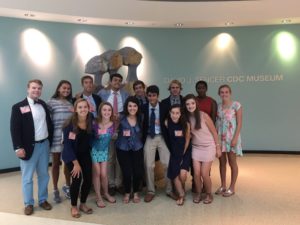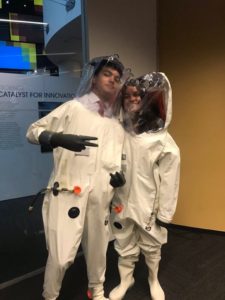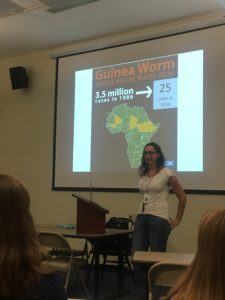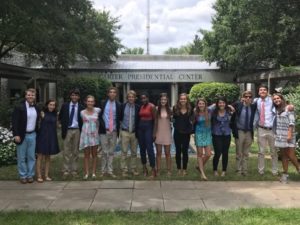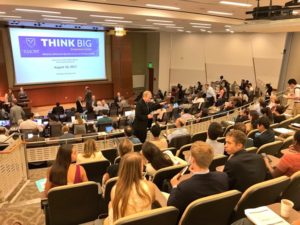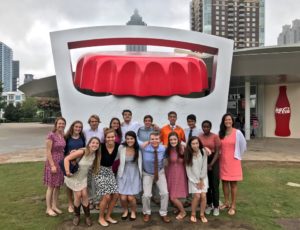Reflections from Julia Duarte (GHF 2020)
On our last day, our 7:30 alarms rang in our ears as we woke up and proceeded to prepare for the day ahead. All of the Fellows met in the lobby at 8:15 and we headed to pick up our breakfast. Bringing our usual bagels and coffee with us on the bus, we set out to Emory University. Mrs. Hall and Mrs. Goodson decided to challenge us with an early morning scavenger hunt around Emory. Each cohort was a team and was given a list of buildings and statues and a map. We then proceeded to search for and take pictures of different structures in the humid climate. After walking around the campus for thirty minutes, the three groups met up at the bus to go to our next stop.
Our next destination was the David J. Spencer CDC Museum. We spent over an hour and a half viewing many exhibits throughout the three floors of the museum. Each exhibit was filled with the many accomplishments of the CDC, along with the vast accounts and facts of many diseases and illnesses. The first exhibit covered Ebola, which comprised of fascinating images and original artifacts from 2014. As we headed down the stairs, we read from walls of information, including of the story of AIDS, a little on Guinea Worm disease, and the obesity problem in the United States. In a separate room downstairs, we took turns putting on BSL 4 suits and experiencing the load of clothing that health workers had to wear during the Ebola epidemic. Afterwards, we met upstairs and drove to Victory Sandwich Bar for lunch.
After a tasty lunch, we traveled to the Carter Center in Atlanta, which, sponsored by President Jimmy Carter, works to solve diplomatic issues peacefully as well as working to help impoverished communities worldwide. We had the pleasure of speaking with Angelia Sanders, a Hampton Roads native and former Peace Corps worker, who talked with us mainly about the Carter Center’s effort to make guinea worm disease the second disease ever eradicated after smallpox. She described her experience living in a South Sudanese village helping the community eradicate guinea worm. We all found her talk extremely interesting and engaging, giving us insight into the lives of both those affected by Neglected Tropical Diseases (NTDs) like Guinea worm and also of those trying to eliminate them.
After our interesting talk with Mrs. Sanders, we were given an hour to look around the Jimmy Carter Presidential Museum. Many of us enjoyed the Countdown to Zero: Defeating Disease exhibit. It elaborated on the process of eradicating diseases, such as Guinea worm disease, polio, and river blindness. Other parts of the museum included the life of Jimmy Carter, his biggest accomplishments in office, and even a replica of the Oval Office in the White House. Then, we headed back to the hotel and had a few hours to relax and pack our bags for our travelling day tomorrow.
After a delicious dinner at a local Tex-Mex restaurant, we all gathered to discuss the central mission of the Global Health Fellows Program and modify our guiding mission statement. This gave us the opportunity to set our goals for the upcoming year and those that follow. We also discussed ways to keep each other accountable for staying up to date on pressing global health issues and news. We all feel confident and inspired heading into the coming year: ready to accomplish our goals and put our thoughts into action.
